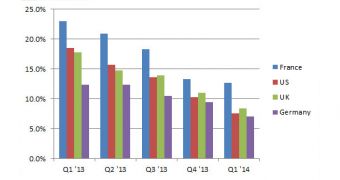Windows XP might be installed on 28 percent of desktop computers worldwide but, according to some new statistics, users are quickly stepping away from it in an effort to remain secure and keep data protected.
International data from Qualys’ BrowserCheck shows that the United Kingdom is leading the Windows XP migration, so the 13-year-old operating system is experiencing a steep decline in the country. The same is happening in the United States too, Wolfgang Kandek, CTO of Qualys, said today, but there still are some countries where people simply can’t abandon Windows XP.
“The UK and US have made the most progress of the countries we studied, reducing exposure in enterprises by more than half since Q1 2013 – down to 8% this quarter from 18%,” Kandek explained.
Not the same thing can be said about France, where Windows XP usage remains pretty high despite all efforts made by Microsoft to emphasize the risks of staying with an unsupported operating system.
Approximately 23 percent of the businesses in the country are still using Windows XP right now, but many have already made plans to migrate to a newer OS version sometime in the coming months.
“While French businesses have reduced exposure by nearly half, the country is most at risk with 13 percent of enterprises still using XP, down from 23 percent in Q1 2013 – significantly higher than the other countries we studied. At this rate, it will take at least an entire calendar year for XP exposure to be eliminated,” Kandek added.
The security expert then went on to explain that Windows XP must be isolated as much as possible in order to make sure that hackers won’t reach computers running it, especially because cybercriminals will attempt to find bugs and vulnerabilities that can be exploited to reach personal data.
Deploying security software capable of protecting a Windows XP machine is also an important thing that you need to do, even though everyone agrees that third-party applications cannot fully replace support offered by Microsoft and, in some cases, could fail to block incoming attacks.
As far as consumers are concerned, 28 percent of them are still running Windows XP, according to stats provided earlier this month, so many will stick to this OS version after end of support officially arrives in a few hours.
Staying on the safe side shouldn’t be too difficult at first, but as time passes by, more hacks and bugs could be found in the operating system and thus turn your computer into an easy target for cybercriminals worldwide.

 14 DAY TRIAL //
14 DAY TRIAL //